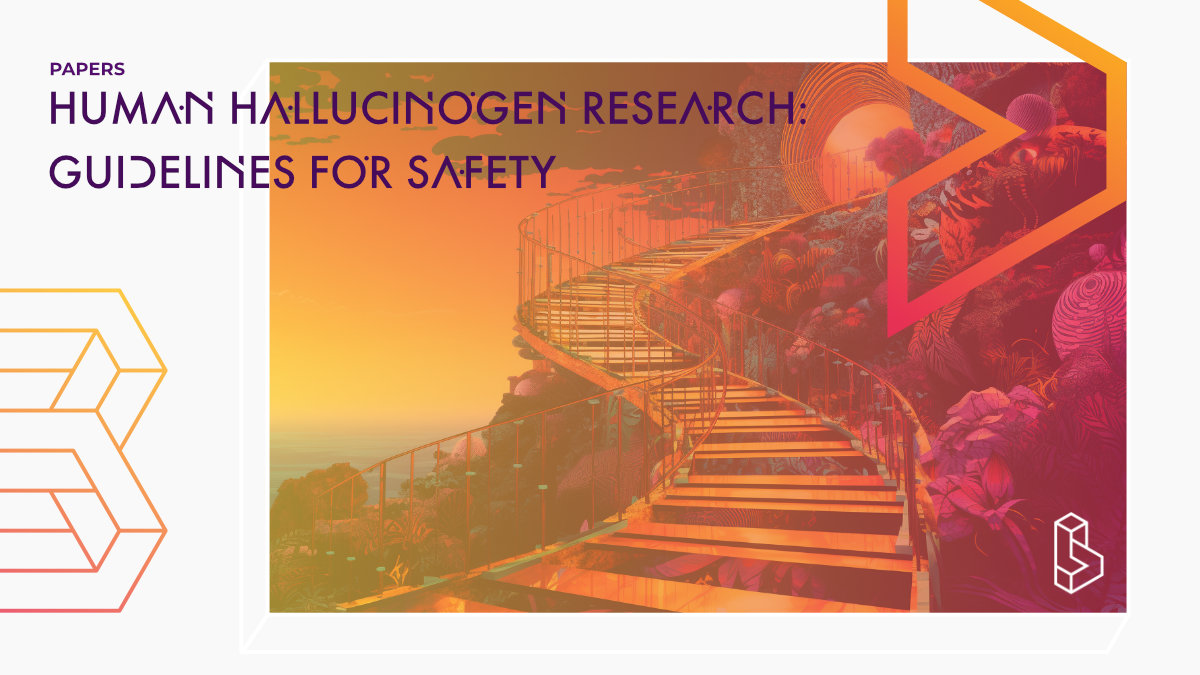This 2008 manuscript set out the commonly used safety guidelines when researching psychedelics. It urges researchers to check for (a family history of) psychotic disorders, the need for trust with the monitors, and the risk of an overwhelming trip.
Abstract of Human hallucinogen research
“There has recently been a renewal of human research with classical hallucinogens (psychedelics). This paper first briefly discusses the unique history of human hallucinogen research and then reviews the risks of hallucinogen administration and safeguards for minimizing these risks. Although hallucinogens are relatively safe physiologically and are not considered drugs of dependence, their administration involves unique psychological risks. The most likely risk is overwhelming distress during drug action (‘bad trip’), which could lead to potentially dangerous behaviour such as leaving the study site. Less common are prolonged psychoses triggered by hallucinogens. Safeguards against these risks include the exclusion of volunteers with personal or family history of psychotic disorders or other severe psychiatric disorders, establishing trust and rapport between session monitors and volunteer before the session, careful volunteer preparation, a safe physical session environment and interpersonal support from at least two study monitors during the session. Investigators should probe for the relatively rare hallucinogen persisting perception disorder in follow-up contact. Persisting adverse reactions are rare when research is conducted along these guidelines. Incautious research may jeopardize participant safety and future research. However, carefully conducted research may inform the treatment of psychiatric disorders, and may lead to advances in basic science.”
Authors: Matthew W. Johnson, William A. Richards & Roland R. Griffiths
Summary of Human hallucinogen research
After several decades of dormancy, research on the effects of classical hallucinogens on humans has been recently renewed. This research includes basic-science studies on cognitive neuroscience and perception, time perception, hallucinogen pharmacokinetics and metabolism, model psychosis, and experiences having enduring personal meaning and spiritual significance. Recent clinical studies have administered hallucinogens to evaluate their safety and efficacy in the treatment of psychiatric disorders, and the use of ayahuasca in religious ceremonies may receive increased scientific investigation within the United States.
The authors use the term “hallucinogen” to refer to the classical hallucinogens, sometimes called “psychedelics”, “psychotomimetics”, or “entheogens”. The terms “psychedelic”, “psychotomimetics”, and “entheogens” highlight only a single aspect of the much broader range of hallucinogen effects.
Find this paper
Human hallucinogen research: guidelines for safety
https://doi.org/10.1177/0269881108093587
Open Access | Google Scholar | Backup | 🕊
Cite this paper (APA)
Johnson, M. W., Richards, W. A., & Griffiths, R. R. (2008). Human hallucinogen research: guidelines for safety. Journal of Psychopharmacology, 22(6), 603-620.
Authors
Authors associated with this publication with profiles on Blossom
Matthew JohnsonMatthew Johnson is an Associate Professor of Psychiatry and Behavioral Sciences at Johns Hopkins University. His research is concerned with addiction medicine, drug abuse, and drug dependence.
Roland Griffiths
Roland R. Griffiths is one of the strongest voices in psychedelics research. With over 400 journal articles under his belt and as one of the first researchers in the psychedelics renaissance, he has been a vital part of the research community.
William Richards
William A. 'Bill' Richards is one of the pioneering psychedelic researchers (Johns Hopkins), a teacher at CIIS, and clinician in private practice.
Institutes
Institutes associated with this publication
Johns Hopkins UniversityJohns Hopkins University (Medicine) is host to the Center for Psychedelic and Consciousness Research, which is one of the leading research institutes into psychedelics. The center is led by Roland Griffiths and Matthew Johnson.

